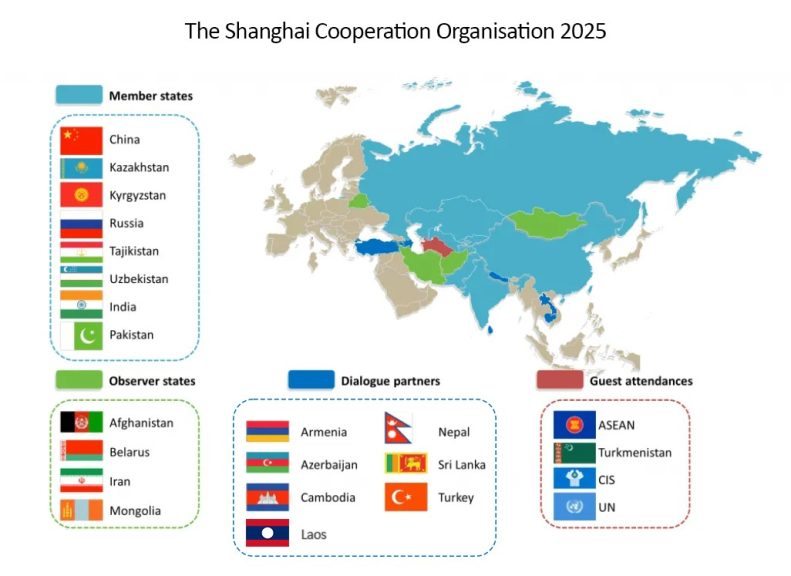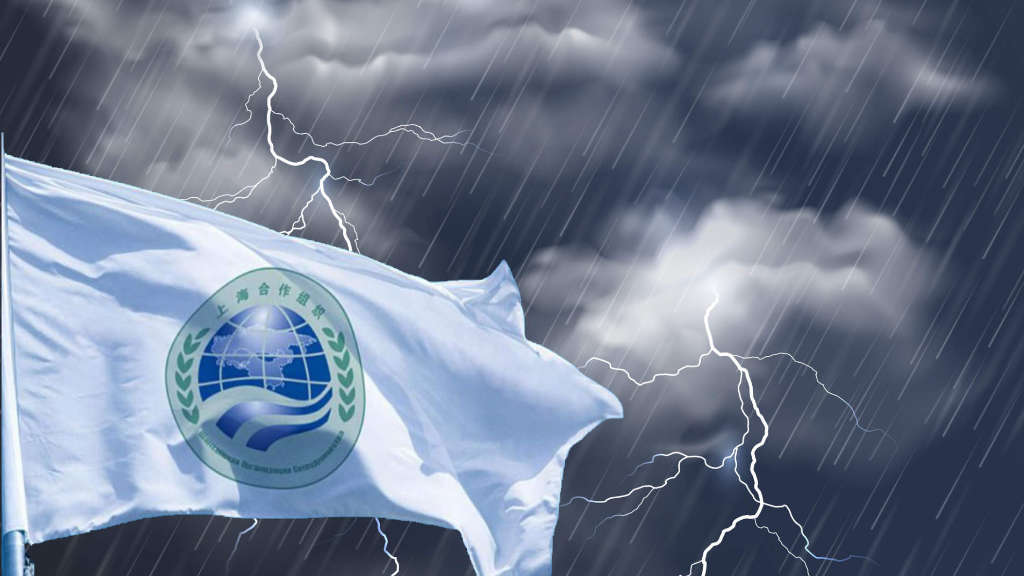The countries of the Shanghai Cooperation Organization (SCO) are preparing for the annual Heads of State summit, which will take place from August 31 to September 1 in Tianjin, China. Both Russia and China have stated they intend to take the SCO to a level that “goes up forever.” However, as Russia’s Foreign Minister, Sergey Lavrov, has pointed out, “Russia has many debatable issues with China, India, and the CIS countries, which require finding a balance of interests and not using threats and ultimatums.”
This will be put to the test in Tianjin in particular, due to India’s tough stance, which is asking the SCO to criticize Pakistan, another SCO member, for “supporting terrorism.” As a result, Prime Minister Modi’s participation in the SCO summit remains in question. Another complex issue revolves around Armenia and Azerbaijan, which are both dialogue partners but wish to join as full members. Both currently have tense relations with Russia and with each other.
The SCO at present includes full members Belarus, China, India, Iran, Kazakhstan, Kyrgyzstan, Pakistan, Russia, Tajikistan, and Uzbekistan. Afghanistan and Mongolia are observers, while Armenia, Azerbaijan, Bahrain, Cambodia, Egypt, Kuwait, Maldives, Myanmar, Nepal, Qatar, Saudi Arabia, Sri Lanka, and the UAE are dialogue partners.
Preparations for the annual summit of the Shanghai Cooperation Organization entered a decisive phase following the meeting of the SCO foreign ministers in Tianjin ten days ago, which we covered extensively here.
This year’ SCO host, Chinese President Xi Jinping, has outlined a number of ideas for developing the group, calling the successful holding of the next summit the top priority. However, this coincides with geopolitical problems associated with the tense situation in relations both between SCO members and between states that are only applying for membership in this organization.
Lavrov has commented on this, saying, “Of course, we have many issues that cause disputes that require additional consideration and additional mutual concessions with our great neighbors—with China, with India, and with the CIS countries, the Eurasian Economic Union. The closer the cooperation, the more issues arise, in which everyone wants to defend their interests a little more.”
An illustration of the Russian minister’s words and the entire complexity of the task of the Chinese organizers to avoid conflicts and scandals at the summit in Tianjin is India’s tough position concerning Pakistan.
While Sergey Lavrov calls for compromise, the Indian leadership has proclaimed an alternative principle of “zero tolerance” for terrorism, making any compromises inappropriate. Delhi accuses Pakistan of organizing the April 22 terrorist attack in the city of Pahalgam in Kashmir, which killed 26 people. A short conflict between the two sides subsequently broke out.
In his speech at the meeting of the SCO defense ministers held on June 25-26 in Qingdao, China, Indian Defense Minister Rajnath Singh placed particular emphasis on India’s position and took a more decisive stance towards Pakistan. He said, “It is imperative that those who sponsor, encourage, and exploit terrorism for their narrow and selfish ends are made to face the consequences. Some countries are using cross-border terrorism as a policy tool and providing safe haven to terrorists. There should be no place for such double standards. The SCO should not hesitate to call out such countries.” However, this statement was not included in the Qingdao minutes, and as a result, the Indian side refused to sign the joint declaration of the SCO defense ministries.
India’s determination not to deviate from its principles, which in Delhi’s interpretation should primarily be directed at its global differences with Pakistan, was also reaffirmed at the BRICS summit in Rio de Janeiro by Prime Minister Narendra Modi.
Inviting BRICS leaders to the 2026 BRICS summit, which will be chaired by India, Modi said, “There should be no hesitation in imposing sanctions against terrorists. Victims and supporters of terrorism cannot be on the same scale. Silent consent to terrorism, support for terrorism, or terrorists should not be acceptable under any circumstances.”
This means that Modi’s participation in this year’s SCO summit in Tianjin remains in question due to disagreements over security and counterterrorism, which puts the host of the meeting, Chinese President Xi Jinping, in a difficult position.

Another problem for the SCO in 2025 is the need to protect itself from new threats and risks that may arise if new members are admitted to the organization.
This issue was openly acknowledged in Tianjin earlier this month by the Belarusian Foreign Minister, Maxim Ryzhenkov. He stated that “Belarus emphasizes the commitment to the “Shanghai spirit” based on mutual respect, equality, and solidarity. The entry into the SCO states that neglect of its principles or transfer of bilateral problems to its platform is inappropriate and harmful.”
For Russia, a new dilemma is how appropriate any increase in the level of interaction with the SCO by Armenia and Azerbaijan might be. They have had the status of SCO dialogue partners since 2015 but have not yet resolved bilateral issues nor signed a peace treaty.
Sources in Moscow have said that “Armenia does not hide its European orientation and its desire to join the European Union. The Armenian authorities are deliberately leading the matter to the severance of ties with the EAEU and the CSTO, which are also partners of the SCO.”
New—as yet unconfirmed—reports about Armenian intentions to have US military contractors operate the strategic corridor in Syunik province and US involvement in Azerbaijan are also creating difficulties.
According to the current SCO rules, applicants for the status of a member state undertake to “strictly observe the Charter and other SCO documents, including the Treaty on Long-Term Good-Neighborliness, Friendship, and Cooperation, which provides for non-participation in unions, organizations, and actions hostile to other member states.”
Both Russia and host China will need to be at their top diplomatic games to ensure squabbling members can reach some solutions to press ahead with more urgent issues. A lot is at stake.
Further Reading

 Русский
Русский













